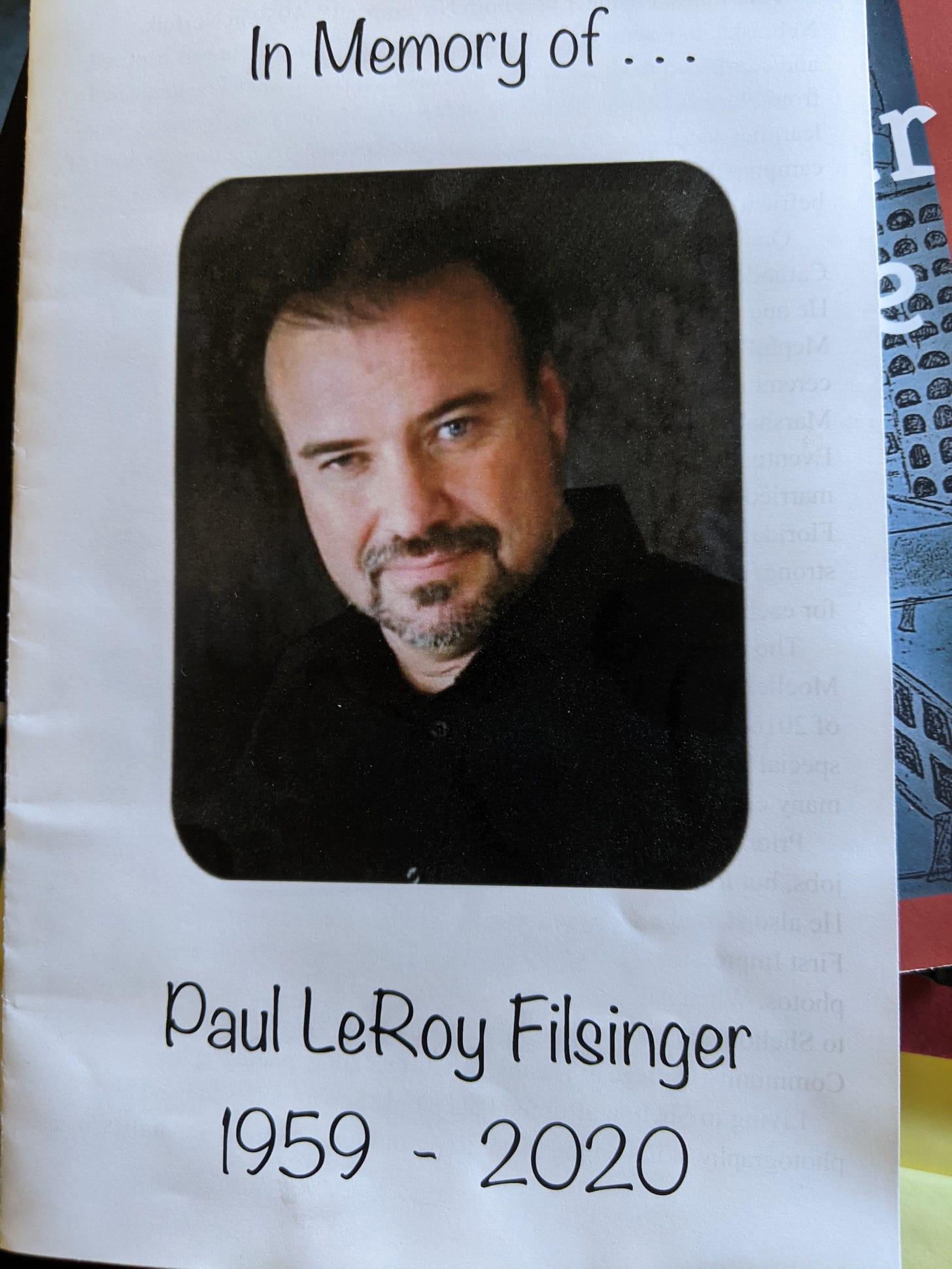If you had told me when I was in high school that I’d end up being a speech teacher and coach, I would have laughed in your face – repeatedly. I was so scared of taking high school speech class that I opted to take it in the summer so that I’d only be subjected to a few weeks of torture rather than an entire semester of it! I also wanted to avoid having to deal with the intimidating speech teacher, and in the summer, the class was taught by someone else – a woman, if memory serves me correctly. Whoever she was, or maybe he was, since I don’t really recall, she had no traumatizing effect on me the way the man who taught the class during the school year did simply by being in his presence. I would have peed my pants on a regular basis if I’d had to face him while delivering a speech.
During the summer, we only had to deliver a few speeches, and I only really remember one of them. It was my demonstration speech. I chose to demonstrate how to remove, clean, and reinsert contact lenses. Even I can’t believe that I chose that as my topic, but at least it was unique. The one problem I faced with it, though, was that I wore these god-awful semi-hard contact lenses that sometimes wouldn’t pop out of my eye as needed, so I worried that I wouldn’t be able to get the lens out of my eye. Often, at home, the things would spring free so violently that they’d bounce off the bathroom mirror and plummet to the floor. They were colored a light blue for that very purpose, and one time, one of them chipped from hitting the edge of the counter so violently. I hated them because they hurt my eyes to wear them and they hurt to remove, but vanity still had a heavy hold on me at the age of fifteen, and I didn’t want to wear glasses, so I put up with the contact lenses, and since I had a conjunctivitis issue with my eyelids, the eye doctor (who most certainly had a sadistic side to him) refused to let me wear soft contacts – thus, the semi-hard contact lens nightmare I dealt with on a daily basis simply because I was too vain to wear glasses in high school.
Fortunately, on the day of the speech, I managed to extract my lens, clean it, and reinsert it without any undo problems. I passed the class with an easy A and went on my merry way, assuming that was the end of my speech career. I seriously believed that I’d rarely, if ever, be expected to give speeches again! Nothing could have been further from the truth.
I have no idea how many times I’ve spoken in front of people. If I count every individual class period over the thirty years of my career and top those with the practicum teaching experiences and the variety of coaching and directing moments I’ve done, then I have well over 40,000 different speaking engagements under my belt. Then, I can add to that all the other times I’ve spoken in front of people for other things, and it certainly surpasses 45,000 speaking engagements.
When I was teaching the public speaking class for all those years, I would tell my freshmen speech students, as they quaked in their shoes while delivering their first speeches for me, that they, too, might end up giving many speeches in their later lives. Like me, at the age of fifteen, they didn’t believe me – just as I wouldn’t have believed anyone who would have told me that I’d become a speech teacher and coach, let alone an amateur stand-up comedian and a frequent speaker at literary events and funerals.
In college, I had to take a couple speech classes for my English degree. I deliberately took the ones that required the fewest speeches. In fact, the first one I took was frequented by members of the UNL football team who specifically chose that class because they didn’t have to speak much or turn up for class very often. I can attest to the fact that the only time I ever saw a couple of the boys was on the rare days in which they had to deliver their speeches. It annoyed me and I know times have changed, but since they didn’t care enough about the class to even come to it, I didn’t care about that class enough to put much effort into the speeches I gave for it. Again, I foolishly believed at that time that I wouldn’t ever be giving speeches outside of that class because at that time, I hadn’t yet decided to become a teacher, which is a profession that requires multiple, daily speeches as illustrated above.
A year later, I signed up to take an interpretive speech class. By then, I had decided to get a teaching endorsement, too, so I took that class a little more seriously, and it was a much smaller class, so there was more focus on each of us from the other students and the instructor. While each delivery made me very nervous, it was a useful class, and I put the techniques learned in it to use all the time during the years I taught and coached. I learned that it’s okay, more than okay really, to feel silly while getting into a delivery and that life goes on after each heart-pounding, fear-inducing speech.
Even after I earned my English degree and my teaching endorsements in English and Spanish, I still had no plans to teach or coach speech. My strengths lie in literature and in writing, so that’s what I wanted to teach. I taught a few years before the man who had been teaching and coaching speech retired. He was the history teacher, but he had taught and coached speech so long that no one thought it odd for the history teacher to be dealing with speech. His replacement hire attempted to teach and coach it, but he failed miserably – he ended up failing miserably as a teacher, too, and was gone after one year. Then, the principal suggested I give it a go, and I reluctantly, and a bit terrifyingly, accepted the responsibility.
My first few years as the speech coach are a complete embarrassment to me now, but I learned a lot, and once I saw that I was stuck with the job, I buckled down to figure things out and get better at it. And I did. Over the years, I went from leaving a speech meet with absolutely nothing physical to show for it, as in no ribbons or medals for any of my students, to leaving every single speech meet with at least one medal, and usually many more than one. I had students qualify for the state speech meet. The first ones didn’t place at state, but eventually, I had students who placed at state. Then, I had a boy win state, and then he won it the next year, too, and was featured by the state on a TV program that showcased the best high school speakers in the state. I drove him to Lincoln for his appearance and got to watch from the darkness as he delivered his state-winning humorous prose interpretation speech. It was a proud moment and certainly one that scared teenager I’d once been would never have been able to believe.
As I mentioned, literature and writing were and still are my forte. I was the editor-in-chief of my high school yearbook, which was my crowning achievement of high school, in my eyes. I attended a large, class A school, so it was a big responsibility and one I took seriously. I’d taken the requisite journalism class as a sophomore. From there, you decided if you wanted to be on the newspaper staff or the yearbook staff, and the teacher would help decide your duties in your junior year. She placed me as the student living section editor and then noticed my abilities and tapped me to be the editor in my senior year. I was over the moon, and I spent countless hours on the yearbook. It ended up winning a state award, and I’m still quite proud of it. What does this have to do with speech, you may be wondering? Let me tell you. At the end of each year, the editors of the newspaper and the yearbook would give speeches at the journalism banquet in which we’d talk about the things our teams had accomplished that year and we’d pass the baton to the next year’s editor. By then, I had fully come into my smartass side, and I thought I easily knew my staff and all that we’d done well enough that I could just wing that speech. Sigh. Massive sigh. Never, ever wing a speech if you have ample time to prepare for it. Understandably, if you are put on the spot and asked to say a few words at some event, you will have to wing it, but when you know, for an entire school year, that you will be required to give a speech about the year’s accomplishments, then for the love of all that is holy, prepare for it! The editor of the newspaper, Lisa, did, and her speech was lovely and concise and to the point and had great comments about her staff. My speech was the embarrassment of my life – well, maybe not that extreme, but close. I got up to talk, looked out at the small crowd of faces turned toward me, and totally blanked. I couldn’t even remember my co-workers’ names for a minute, let alone anything they’d accomplished. I really don’t know what I said; I did manage to talk and ramble on about each person, but I certainly didn’t say the things I would have, and should have, if I’d bothered to prepare even a little bit. I burned with shame as I talked, and I said a lot of “ums” and “ahs” as I stumbled around in my brain searching for what to say that would sound even a bit coherent. I am still, to this day over thirty years later, very sorry for the pathetically sorry speech I gave at that banquet, and I wish I could go back in time and do it over, the right way this time. Despite my embarrassment, I am glad that I failed at that because I learned how important it is to NOT deliver a speech, especially an important one, by the seat of your pants. You should care about your subjects, your audience, and yourself when you deliver a speech. Now, I’m going to contradict myself a little bit here, but when I taught speech, I made the students get up every day for a couple weeks and totally wing a very short speech on a specific topic each day. These were icebreaker speeches whose only goal was to get the kids used to standing in front of their peers while talking. They were all about simple topics that they were already experts about. I’d ask them to tell us about their favorite food, a little about their families, their favorite places they’ve visited, something interesting or unique about themselves, etc. I didn’t ask them to talk about anything that they already didn’t know a lot about – those speeches came later. As they talked, I took notes on their mannerisms and how well they held themselves. Each person is unique in the things he does when he’s nervous or uncomfortable. One boy rocked back and forth on his heels so violently that I feared he was going to fall over. A girl literally backed herself against the whiteboard, turned sideways, and clutched it. Some stretched their sleeves over their hands while others couldn’t leave their hair alone. Some would swing their arms wildly while others would wring their hands or hold them so tightly together that their fingers would turn white. There would be noticeable filler word preferences, too, from the standard “um” to “like” to “you know” to odd tongue clicking or lip smacking. I’d notice if the kids could make eye contact or not and if they could be heard or not. There were many mumblers and floor talkers as well as those who preferred to make sustained eye contact with the ceiling tiles and even a few who gave entire speeches with their eyes closed tight. I would share my notes with them and point out the things they were naturally doing well along with the things they were doing simply from fear and that they needed to work on eliminating to make for a stronger speech delivery. My overall goal each semester was simply to make the students more comfortable as they spoke and then to get them to see the importance of preparation in aiding their comfort levels. I would ask them to give me a comfort level at the start of the year, and then at the end of the semester, I would ask them again. Every single student every semester of every year I taught the class reported a higher level of comfort at the end of the semester, which was wonderful. Jerry Seinfeld did a great bit about how the number one fear of people is public speaking while the number two fear is death. (You can view a clip of that here: Jerry Seinfeld and fear of public speaking) He went on to say that meant that the majority of people would rather be the person in the casket at a funeral than the person giving the eulogy at that funeral. I would share this bit with my students, and they would usually nod in agreement, so I would tell them that by the end of the semester, I wanted those fears to have flipped for them. Oddly enough, I have now spoken at six funerals. It was never my intention to become someone who commonly speaks at funerals, but that is what has happened, nevertheless. It began with my beloved grandmother’s death during my freshman year of college, right before finals’ week of my first semester. She was my favorite person, and I loved her dearly, so her death hit me hard. I wrote a poem to express my loss and left it out for my mother to read. That was the beginning of my funeral-speaking journey. My mother woke me the next morning in tears and asked me to read the poem at my grandmother’s funeral. I initially said “no,” but I soon relented because I loved my grandma and wanted to do something special for her. When it came time for me to rise and read the poem, though, I almost didn’t make it. I felt dizzy and scared in addition to the overwhelming grief I was already feeling. But rise I did, and I took up position near her casket and began to read the poem. Fortunately, it was short because by the end of it, I was crying pretty hard, and I doubt that everyone understood the final words of it, but by then, everyone in the church was crying, too. I saw the power of my words that day because so many relatives and friends came up to me afterward to thank me for doing that. A few of them still talk about it today, thirty-four years later. I ended up talking at my grandfather’s viewing years later. The minister, a stickler for Lutheran “rules,” wouldn’t let me speak at his funeral, but I was “allowed” to say some words at his viewing at the mortuary. Can you tell I’m still a tad bitter about that after all these years? Yep, I admit it. That minister barely knew my grandfather, a very funny man who deserved a better tribute than was given him at the funeral, but I did get to say some words at his viewing, at least. Then, years later, I was asked to speak at my other grandmother’s funeral which took place in a more relaxed Methodist church. After that, with all my grandparents deceased (my paternal grandfather died prior to the start of my speaking “career”), I assumed that my eulogizing at funerals had come to an end. Once again, I was wrong about the road life would take me down. I later spoke at the funeral of my now ex-father-in-law, and I had a side-gig at my brother’s wedding. Then, in the span of two years, I lost two extremely important people in my life – my best friend since college and my beloved uncle. My friend, Amy, was Catholic, so I also was not allowed to speak at her funeral, but her husband did ask me to speak at her viewing, which was held in a large mortuary in Omaha. Hundreds attended her visitation, a true testament to the wonderful person Amy was, so her visitation held the largest crowd for whom I’d ever given a eulogy. Sadly, and memorably, that visitation took place on my 50th birthday. It certainly wasn’t the way I would have preferred to spend my birthday, but I was so honored that I got to express my love for my best friend in front of a room full of people who also loved her. If I’d still been terrified of public speaking, I wouldn’t have had that honor. Two years later, my wonderful uncle, Paul, passed away at the age of 60. He and I had been more like siblings growing up because he was only eight years older than me. His death devastated me, as did Amy’s, and I miss them both every day. With great honor, I accepted the request to deliver his eulogy. Paul was the only son of my aforementioned, funny grandfather, and Paul had carried on the tradition of being funny and telling jokes and humorous stories at every family gathering, so, naturally, I peppered his eulogy with humor to honor him. I know he would have appreciated the things I said about him.
Here is a link to a blog post I wrote in which I shared the obituary and the eulogy I wrote for him: Paul Filsinger So often, people fear speaking at funerals, but I think it’s the highest honor we can pay the deceased person who can no longer speak for himself. One of the bravest things I’ve ever witnessed was when the widow of my dear friend and fellow teacher rose at his jam-packed funeral and walked to the lectern. There was a collective gasp of disbelief that passed over the crowd. Even I couldn’t believe she was going to speak because her husband had died suddenly and unexpectedly only a few days prior, but speak she did, and she spoke so eloquently and lovingly of him that I’m still awed by what she did, these four years later. If she, a horribly grieving and shattered woman, can get up and talk for twenty minutes about her husband in front of thousands of people, then anyone can, and should, deliver a funeral speech if asked to do so. I hesitate to call those speeches eulogies because too many people now equate the word eulogy with a funeral speech, but a eulogy is simply a speech of praise. Thus, you can and should give eulogies for living people. After all, I think most people would prefer to hear words of praise about them while they are still alive to hear them. I’m sure they would also want someone to say something nice about them after they are gone, too, but eulogies are not reserved for the dead. If you ever have the honor of being asked to deliver a eulogy for someone living or dead, I hope you will accept the challenge and not shirk it out of fear or uncertainty in your abilities. Naturally, the more speaking experience you have, the better you will do, but even if you don’t have much, or any, prior experience, I want you to say “yes” to the opportunity and then follow these guidelines to help you prepare and deliver the best eulogy possible for the special person in your life. (The rest of the post is for paid subscribers.)
Listen to this episode with a 7-day free trial
Subscribe to Tomes and Topics to listen to this post and get 7 days of free access to the full post archives.















